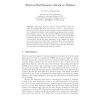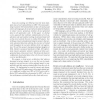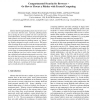24 search results - page 1 / 5 » Trust on Web Browser: Attack vs. Defense |
ACNS
2003
Springer
14 years 3 days ago
2003
Springer
This paper proposes a browser spoofing attack which can break the weakest link from the server to user, i.e., man-computerinterface, and hence defeat the whole security system of ...
NDSS
2009
IEEE
14 years 1 months ago
2009
IEEE
Cross-site scripting (or XSS) has been the most dominant class of web vulnerabilities in 2007. The main underlying reason for XSS vulnerabilities is that web markup and client-sid...
CCS
2010
ACM
13 years 7 months ago
2010
ACM
Cross-origin CSS attacks use style sheet import to steal confidential information from a victim website, hijacking a user's existing authenticated session; existing XSS defen...
TOIT
2008
13 years 6 months ago
2008
In spite of the use of standard web security measures (SSL/TLS), users enter sensitive information such as passwords into scam web sites. Such scam sites cause substantial damages...
IEEEARES
2007
IEEE
14 years 1 months ago
2007
IEEE
Identity theft through phishing attacks has become a major concern for Internet users. Typically, phishing attacks aim at luring the user to a faked web site to disclose personal ...



